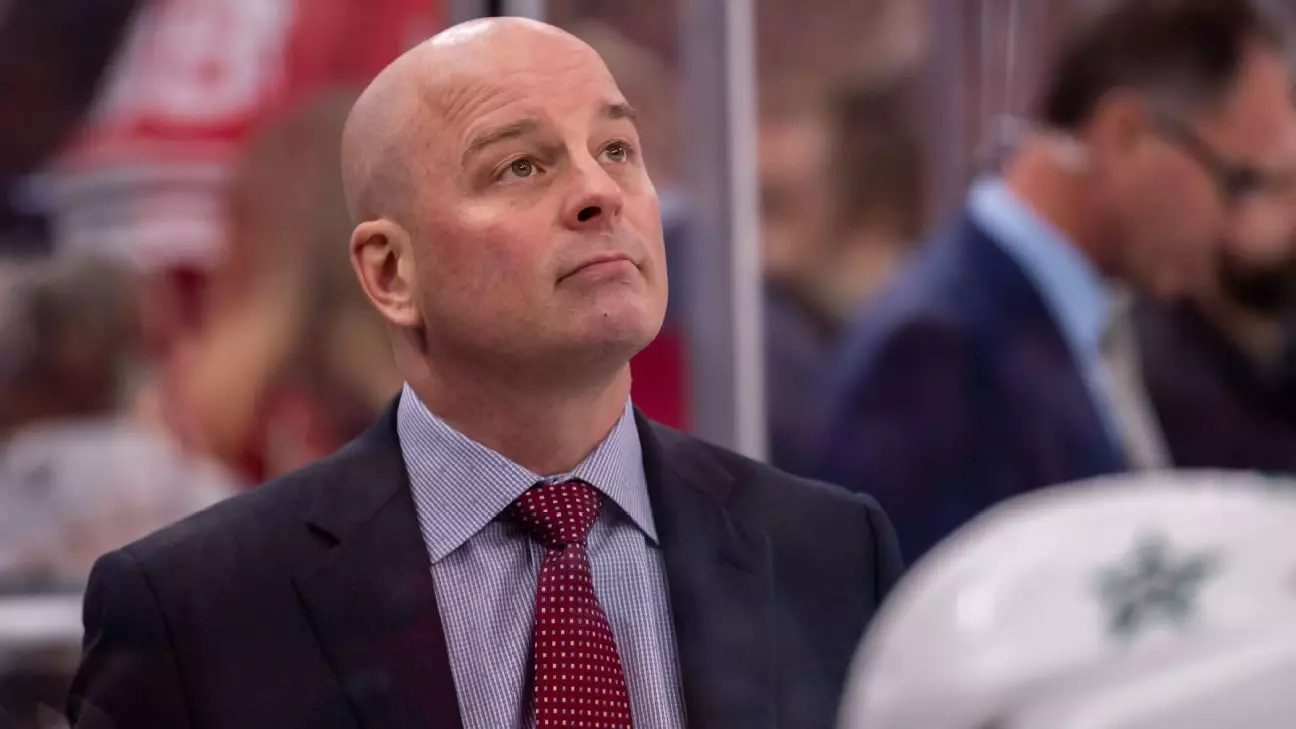The world of professional sports is one of unpredictability and fleeting opportunities. In the latest chapter of the NHL, Jim Montgomery’s return to the St. Louis Blues signifies not only a second chance for him as a head coach but also a crucial turning point for the franchise itself. The Blues, having faced challenges under previous coach Drew Bannister, brought Montgomery back, hoping his experience and leadership will reinvigorate a team that has recently struggled to find its footing.
Montgomery’s reappointment comes just days after he was dismissed from his role with the Boston Bruins, following a rocky start to the season. This shift in fortune could buoy his spirits as he dons the iconic blue note of the Blues—an emblem that represents both pride and ambition. “Crazy — there’s no other word for it,” said Montgomery, reflecting on transitioning from a challenging stint with the Bruins to his emotional homecoming in St. Louis.
With a background that includes serving as an assistant coach for the Blues, there’s an undeniably familial aspect to his return. Montgomery’s familiarity with many players is poised to ignite the morale necessary for a turnaround. He emphasizes a strong belief in the lineup, acknowledging their commitment and potential to succeed. This pre-existing rapport may facilitate smoother navigation through the rigors of an NHL season, where cohesion often translates to better performance on the ice.
Despite the potential for success, Montgomery steps into a complicated situation. The Blues have seen a stark decline in performance, highlighted by a disappointing start of 9-12-1. They rank near the bottom of the league in critical categories such as goals scored per game and special teams effectiveness on both the power play and penalty kill. Montgomery faces the daunting task of rekindling the competitive spirit that once propelled the franchise to a Stanley Cup victory in 2019.
The challenges are substantial. Under previous leadership, the team missed playoffs last season, a stark contrast to their championship pedigree just a few years prior. Montgomery’s optimism stands in stark relief against this backdrop of adversity. His past experience guiding teams to playoff appearances infuses a renewed hope that success is within reach, albeit with hard work and strategic adjustments.
Montgomery’s journey has not been without its trials. His termination from the Stars due to unprofessional conduct serves as a stark reminder of how personal conduct can result in professional ramifications. This phase of his career might have imbued him with valuable lessons on both leadership and personal accountability. As he embarks on this second act with the Blues, it is likely that his experiences, both positive and negative, will inform his coaching methodology, fostering a nurturing and performance-oriented environment.
Montgomery’s strong point percentage of .659 speaks volumes of his capabilities as a coach. When he was let go by Boston after a disappointing start, the contrast between his coaching history and current circumstances created a compelling narrative. Teams may falter, but talent often shines through. Blues’ president Doug Armstrong recognized this and articulated a willingness to invest in Montgomery’s potential through a thoughtful five-year contract, a commitment that underscores a shared vision of lifting the team back to the elite levels of the NHL.
Montgomery’s future in St. Louis represents a convergence of opportunity and responsibility. He has committed to fostering an environment conducive to growth—not only for the franchise but also for the players who form its core. His approach is introspective, rooted in building lasting relationships that might enhance team chemistry on and off the ice.
Through this lens, Montgomery’s return is framed not just as a reinforcement for the present, but as a foundational step for future aspirations. As he settles back into the role as the Blues’ head coach, the expectation is clear: rise to the challenge, rekindle the franchise’s winning culture, and instill long-term success. In the demanding landscape of the NHL, the desire to succeed often hinges on perseverance, adaptability, and a relentless focus on relationships—principles Montgomery now appears poised to embrace fully.

